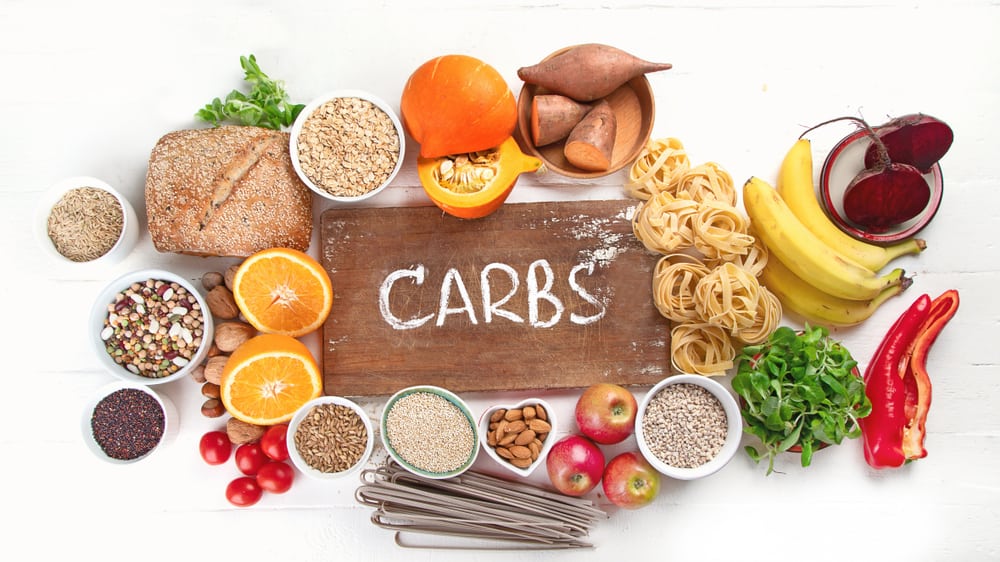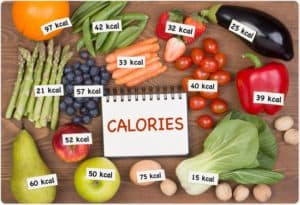What Are Carbohydrates?
There are three macronutrients called carbohydrates, protein, and fat.
Now, carbohydrates are the sugars, starches, and fibers found in fruits, grains, vegetables, and milk products. Though often maligned in trendy diets, carbohydrates are one of the basic food groups that are important to a healthy diet.
They provide fuel for the central nervous system and energy for working muscles. The only problem with them? They also prevent protein from being used as an energy source and enable fat metabolism.
Types Of Carbs
The three primary forms of carbohydrates found in food:
- Starches (also known as complex carbs)
- Sugars
- Fiber
Additionally, words such as whole grains, processed grains, enhanced grains, complex carbohydrates, naturally occurring sugar, added sugar, low-calorie sweeteners, sugar alcohols, and reduced-calorie sweeteners will be used.
It makes sense why it can be tough to determine what kind and how much carbohydrate to eat.
The term “total carbohydrate” on the nutrition label refers to all three forms of carbs. If you are counting carbohydrates, this is the number to focus on.
Starches
Among the foods high in starch are:
- Peas, corn, lima beans, and other starchy veggies
- Dried legumes, including split peas, black-eyed peas, kidney beans, and pinto bean
- Grains such as rice, barley, and oats. (Wheat flour is used to make the vast majority of grain products in the US. Although the variety is growing to include other grains as well, these include pasta, bread, and crackers.)
The grain category can be further divided into the whole grain and refined grain.
Three components make up a grain:
- Bran
- Germ
- Endosperm
The grain’s hard outer shell is known as the bran. It is the portion of the grain that contains the majority of the B vitamins, minerals, and fiber.
The next layer is the germ, which is rich in nutrients including vitamin E and vital fatty acids.
The soft material in the core of the grain is the endosperm. The starch is in it. Whole grain refers to a food that contains the complete grain kernel.
When you consume whole grain foods, you receive all of the nutrients that whole grains have to offer because they contain bran, germ, and endosperm.
Sugar
Another form of carbohydrate is sugar. Another name for sugar is a simple or fast-acting carbohydrate.
Sugar comes in two primary varieties:
- Natural sugars, like those found in milk or berries
- Additional sugars, such as those added during processing, like when the fruit is canned in heavy syrup or when sugar is added to bake cookies.
The number of sugar grams on the nutrition facts label includes both added and natural sugars.
Sugar goes by a lot of different names. Table sugar, brown sugar, molasses, honey, beet sugar, sugar cane, confectioner’s sugar, powdered sugar, raw sugar, turbinado, maple syrup, high-fructose corn syrup, agave nectar, and sugar cane syrup are a few examples of common names.
Table sugar may also be referred to by its chemical name, sucrose. Fructose, the sugar found in fruit, and lactose, the sugar found in milk, are two similar terms. Other sugars on labels can be identified since their chemical names also end in “-ose.” For instance, lactose, maltose, fructose (also known as levulose), and glucose (also known as dextrose).
Fiber
There is no fiber in animal goods like milk, eggs, meat, poultry, or fish because fiber only comes from plant foods.
Fruits, vegetables, whole grains, nuts, and legumes all include fiber, which is an indigestible component of plant-based diets. Dietary fiber is mostly not digested when you eat it; instead, it travels through your intestines.
Adults should attempt to consume 25 to 30 grams of fiber daily for excellent health. While it is wise to aim for this target, any increase in fiber in your diet might be helpful as the majority of Americans do not consume nearly enough fiber. The majority of us only consume around half of what is advised.
Fiber supports digestive health, keeps you regular, and helps you feel happy and full after eating.
A high-fiber diet may also have additional health benefits, such as lowering cholesterol levels, which have been postulated by some.
Among the best sources of dietary fiber are:
- Legumes and Beans. Consider lentils, white beans, chickpeas (garbanzos), pinto beans, kidney beans, and black beans.
- Fruits and vegetables, especially those with edible peel (like apples, corn, and beans) and seeds (for example, berries).
- Complete-grain pasta
- Cereals with whole grains (Seek out products produced from whole wheat, wheat bran, and oats that provide three grams or more of dietary fiber per serving.)
- Whole grain bread (Bread should have at least three grams of fiber per slice in order to be considered a healthy source of fiber. Another tip is to look for loaves with whole grains listed as the first component. oats or whole wheat, for instance.) Nowadays, many grain products have “double fiber,” or additional fiber.
Try a variety of nuts. While almonds, walnuts, and peanuts are rich sources of fiber and healthful fat, be mindful of your portion sizes as they are high in calories per serving.
A decent source of fiber often comprises 2.5 to 4.9 grams per serving, whereas an excellent source typically contains five grams or more.
The greatest way to acquire fiber is through food, not a supplement. These foods are rich in nutrients and contain a variety of essential vitamins and minerals in addition to fiber. They might even have nutrients in them that haven’t even been identified yet!
Functions Of Carbs
Carbohydrates provide a person with energy. However, people can still obtain energy from foods containing protein and fats, but carbohydrates are the body’s preferred source. So, if a person does not have a good supply of carbohydrates, their body will use protein and fats as an energy source.
However, as protein is vital for so many other essential functions, such as building and repairing tissues, the body prefers not to use it for energy. Carbohydrates break down into glucose in the body.
Glucose moves from the bloodstream into the body’s cells with the help of the hormone insulin. All of the cells in a person’s body use glucose to function. The brain uses 20–25% of a person’s glucose when they are at rest and is reliant on a constant supply.
Good Carbs vs. Bad Carbs
These are found in foods you know are good for you (vegetables) and ones you know are not (doughnuts). This has led to the idea that some carbs are “good” and some are “bad.”
The commonly considered bad carbs include pastries, sodas, highly processed foods, white rice, white bread, and other white-flour foods. These are foods with simple carbs. Bad carbs rarely have any nutritional value.
And the commonly considered good carbs are complex carbs, such as whole grains, fruits, vegetables, beans, and legumes. These are not only processed more slowly, but they also contain a bounty of other nutrients.
Good Carbs Are:
- Low or moderate in calories
- High in nutrients
- Devoid of refined sugars and refined grains
- High in naturally occurring fiber
- Low in sodium
- Low in saturated fat
- Very low in, or devoid of, cholesterol and trans fats
Bad Carbs Are:
- High in calories
- Full of refined sugars, like corn syrup, white sugar, honey, and fruit juices
- High in refined grains like white flour
- Low in many nutrients
- Low in fiber
- High in sodium
- Sometimes high in saturated fat
- Sometimes high in cholesterol and trans fats
Simple Vs. Complex Carbohydrates
Carbohydrates are classified as simple or complex. The difference between the two forms is the chemical structure and how quickly the sugar is absorbed and digested. Generally speaking, simple carbs are digested and absorbed more quickly and easily than complex carbs.
Simple carbohydrates contain just one or two sugars, such as fructose (found in fruits) and galactose (found in milk products). These single sugars are monosaccharides. Carbs with two sugars — such as sucrose (table sugar), lactose (from dairy), and maltose (in beer and some vegetables) — are disaccharides.
Simple carbs are also in candy, soda, and syrups. However, these foods are full of refined sugars and do not have vitamins, minerals, or fiber. They are “empty calories” and lead to weight gain.
Complex carbohydrates (polysaccharides) have three or more sugars. They are often starchy foods and include beans, peas, lentils, peanuts, potatoes, corn, parsnips, whole-grain bread, and cereals.
While all carbohydrates function as relatively quick energy sources, simple carbs cause bursts of energy much more quickly than complex carbs. This is because of the quicker rate in terms of digestion and absorption.
Simple carbs lead to spikes in blood sugar levels and sugar highs, while complex carbs provide more sustained energy.
Replacing saturated fats with simple carbs, such as those in many processed foods, leads to an increased risk of heart disease and type 2 diabetes. It’s best to focus on primarily complex carbs in your diet, including whole grains and vegetables.
Glycemic Index
Nutritionists have said that it’s not the type of carbohydrate, but rather the carb’s glycemic index, that’s important. The glycemic index measures how quickly and how much a carbohydrate raises blood sugar.
High-glycemic foods like pastries raise blood sugar highly and rapidly; low-glycemic foods raise it gently and to a lesser degree. Some research has linked high-glycemic foods with diabetes, obesity, heart disease, and certain cancers.
The right kind of carbs can be incredibly good for you. Not only are they necessary for your health, but they carry a variety of added benefits.
Foods With High Carbs
Dairy Products
- Milk
- Yogurt
Fruits
- Mango
- Bananas
- Oranges
- Apples
- Pears
Dry Fruits
- Raisins
- Dates
Grains
- Brown Rice
- Quinoa
- Buckwheat
- Oats
- Chickpeas
- Peas
- Lentils
Vegetables
- Beets
- Corn
- Potatoes
Sweeteners
- Honey
- Maple Syrup
- Sugar Nectar
Foods With Low Carbs
Fruits
- Watermelon
- Strawberries
- Blueberries
- Blackberries
- Raspberries
Vegetables
- Brocolli
- Red Bell Peppers
- Green Beans
- Spinach
- Mushrooms
- Cauliflower
- Tomatoes
- Soybean
- Celery
Seeds And Nuts
- Almonds
- Walnuts
- Pistachios
- Sunflower Seeds
- Chia
- Flax
Dairy
- Greek Yogurt
- Cheese
- Eggs
Oils
- Olive Oil
Non-Veg Favourites
- Chicken
- Salmon
- Meat
Sources Of Good Carbs To Stay Healthy
By choosing your carbs wisely you should still be able to keep your blood sugar within healthy limits while nourishing your body with important vitamins and minerals.
Here are some of the best sources of good carbs:
- Broccoli
- Cauliflower
- Kale
- Leafy greens
- Asparagus
- Avocado
- Macadamia nuts
- Pumpkin seeds
- Raspberries
Can Carbohydrates Make You Gain Weight?
Carbohydrates are a type of macronutrient that is found in a wide variety of foods and play an important role in the human diet. They are made up of carbon, hydrogen, and oxygen atoms and are classified into three main categories: sugars, starches, and fiber.
It is a common belief that carbohydrates can make you gain weight, but the truth is more complex. In general, weight gain occurs when you consume more calories than your body uses. This excess energy is stored in the body as fat. Therefore, weight gain can occur with any type of food, including carbohydrates, if you are consuming more calories than your body needs.
However, some types of carbohydrates may be more likely to contribute to weight gain than others. Simple sugars, such as those found in sweetened beverages and processed snacks, can be quickly absorbed and converted into energy, leading to an increase in blood sugar levels. This can cause a rapid rise in insulin, which can lead to fat storage and weight gain if consumed in excess.
On the other hand, complex carbohydrates, such as those found in whole grains, legumes, and vegetables, are typically high in fiber and take longer to digest, which can help to keep you feeling full and satisfied. These types of carbohydrates can be a healthy part of a weight loss or weight maintenance diet.
It is also important to pay attention to portion sizes when it comes to carbohydrate-containing foods. Consuming large portions of any type of food can contribute to weight gain, regardless of whether it is high in carbohydrates or not.
In conclusion, carbohydrates can be a part of a healthy diet when consumed in appropriate amounts and types. Simple sugars may be more likely to contribute to weight gain than complex carbohydrates, but overall calorie intake and portion sizes are also important factors in weight management. It is important to choose a variety of complex carbohydrates, such as whole grains and vegetables, and to pay attention to portion sizes to maintain a healthy weight.
Carbohydrates And Obesity
Obesity is a major health issue that affects millions of people worldwide. It is characterized by excess body fat and is often caused by an imbalance between calorie intake and energy expenditure. Carbohydrates have been a controversial topic in the discussion of obesity, with some claiming that they contribute to weight gain and others arguing that they can be a part of a healthy diet.
It is important to understand that all types of carbohydrates, including sugars, starches, and fiber, can be a part of a healthy diet when consumed in appropriate amounts. However, it is also important to be mindful of the type and quantity of carbohydrates that you are consuming.
One of the main concerns with carbohydrate intake and obesity is the consumption of added sugars. These are sugars that are added to foods and beverages during processing, such as high fructose corn syrup and sucrose. Added sugars are often found in processed and packaged foods, as well as sweetened beverages. Consuming large amounts of added sugars can contribute to weight gain and obesity. The World Health Organization recommends that adults and children limit their intake of added sugars to less than 10% of their daily caloric intake.
On the other hand, complex carbohydrates such as whole grains, legumes, and vegetables can be a healthy part of a weight loss or weight maintenance diet. These types of carbohydrates are high in fiber, which helps to keep you feeling full and satisfied. They also provide important nutrients such as vitamins, minerals, and antioxidants.
It is also important to pay attention to portion sizes when it comes to carbohydrate-containing foods. Consuming large portions of any type of food can contribute to weight gain, regardless of whether it is high in carbohydrates or not.
In conclusion, carbohydrates can be a part of a healthy diet when consumed in appropriate amounts and types. It is important to limit added sugars and choose complex carbohydrates, such as whole grains and vegetables, to get the most nutritional value. Paying attention to portion sizes and overall calorie intake is also crucial for maintaining a healthy weight.
Summary
Carbohydrates are essential for providing the body with energy and helping it function optimally. People may have varying requirements for carbohydrates according to their lifestyle, weight, and activity level.
Most people can ensure that they eat a healthy diet by including complex carbohydrates and limiting their intake of refined carbohydrates.
Being thoughtful about carbohydrate choices can help give a person a good blood glucose balance and limit the risk of associated health conditions.














